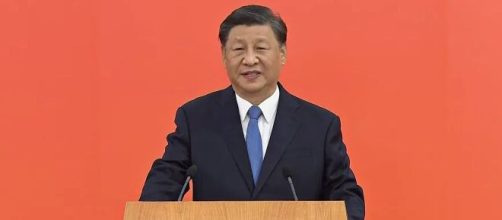Chinese President Xi Jinping joined Hong Kong's July 1 celebrations of the 25th anniversary of its handover from the U.K. to China. Xi's appearance was the first time he had left mainland China since the outbreak of the coronavirus pandemic. That day, he also swore in the territory's new leader, Chief Executive John Lee.
The Chinese leader's trip was "aimed at reinforcing his authority over the city," The New York Times said. Since the start of the pandemic in 2020, Xi had remained within his country's borders, the paper noted.
RTHK, Hong Kong's public broadcaster, noted that Xi had presided over the inauguration of John Lee as the territory's new chief executive.
RTHK reported Xi as saying the new leadership should be more efficient and should improve the way the territory was governed. The broadcaster said Xi had traveled by train, arriving on June 30 and departing on July 1.
'More opportunities than challenges'
The Chinese leader was quoted by RTHK as saying both opportunities and challenges lay ahead of the former British colony "but there are more opportunities than challenges." Xi also said "the relationship between the government and the market" should be "better balanced."
Radio Free Asia quoted the Chinese leader as saying "Hong Kong has lived through turbulent times and risen again from the ashes to renewed vigor." The U.S. government-funded broadcaster quoted former legislator Ted Hui refuting Xi's claims.
"He says Hong Kong has been reborn from the ashes, but I only see anger in Hong Kong; anger and hatred for the regime," Hui said.
Washington expresses solidarity with Hong Kongers
In Washington, D.C., U.S. Secretary of State Antony Blinken released a statement on the eve of the anniversary. He noted that at the time of the handover, it had been agreed that the territory would enjoy 50 years of freedom and autonomy before being fully integrated into China. This year, the handover anniversary was supposed to mark the midway point of those 50 years of autonomous self-government, he said. However, the National Security Law imposed by China had prompted the local government to deprive Hong Kongers of much of their freedom, Blinken said.
"Hong Kong’s leaders have raided independent media organizations, shuttered museums and removed public works of art, weakened democratic institutions, delayed elections, prevented vigils, disqualified sitting lawmakers, and instituted loyalty oaths," he said. Leaders of the opposition had been jailed and the government had accused local protesters of being the instruments of foreign forces, Blinken said.
In a White House statement, National Security Council Spokesperson Adrienne Watson said that "almost all of Hong Kong’s pro-democracy politicians are either in prison pending trial or in exile overseas" as a result of the National Security Law. The world had also seen "the dismantling of Hong Kong’s democratic institutions and the unprecedented pressures on the judiciary, the stifling of academic, cultural, and press freedoms, and the coerced disbandment of dozens of civil society groups and news outlets," she said.
Watson's and Blinken's statements can be found on the White House and State Department websites, respectively.
On Twitter, Kenneth Roth, executive director of Human Rights Watch, said, "Chinese President Xi Jinping claims that 'Hong Kong has been reborn from the ashes, showing flourishing vitality,' as he burns its freedoms and deadens its once-flourishing and vital culture."
Chinese President Xi Jinping claims that "Hong Kong has been reborn from the ashes, showing flourishing vitality," as he burns its freedoms and deadens its once-flourishing and vital culture. https://t.co/E19KlUkgPu
— Kenneth Roth (@KenRoth) July 1, 2022Speaking in an interview with itv, Lord Christopher Patten, the last British governor of Hong Kong, said the Chinese "dictatorship" under Xi was turning the former colony into a "police state." Patten noted that Lee, the new chief executive of the territory, was a former police officer.
Patten added, "If you're going to create a police state why not have a policeman in charge?"
On the 25th anniversary of Britain's handover of Hong Kong to China, HK's last UK governor Lord Patten tells ITV News President Xi Jinping's 'dictatorship' is creating a 'police state'https://t.co/v2lTrTqaWg
— ITV News (@itvnews) June 30, 2022'We are China’s Hong Kong'
Pro-Beijing Hong Kong legislator Regina Ip told The Guardian that the government had been justified in jailing pro-democracy members of the territory's Legislative Council. In an interview published on June 30, she said the government had been "too lenient over the years allowing them to cause havoc." She told the paper she had been saddened by the arrest of the politicians but she wished the legislators "had not gone so far to break the law." Ip told the paper, "We are China's Hong Kong." She stressed that people needed to be "realistic" about the territory's political future.
New leader opens new accounts on Facebook and Instagram
On Twitter, the Hong Kong Free Press reported that incoming Chief Executive John Lee had opened new social media accounts hours before being sworn in by the Chinese president. The news outlet said the accounts were on Facebook and Instagram, as well as Weibo, a Chinese platform.
Hong Kong's incoming chief executive John Lee launched new accounts on Facebook, Instagram and Weibo on Friday morning, as he prepared for his inauguration by Chinese leader Xi Jinping on the city's 25th Handover anniversary.
Photo: John Lee, via Facebook. pic.twitter.com/W0VNLWUxUG
— Hong Kong Free Press HKFP (@hkfp) July 1, 2022RTHK quoted Xi saying Hong Kongers had learned from bitter experience that the territory "must not be destabilized and cannot afford to seek chaos."


